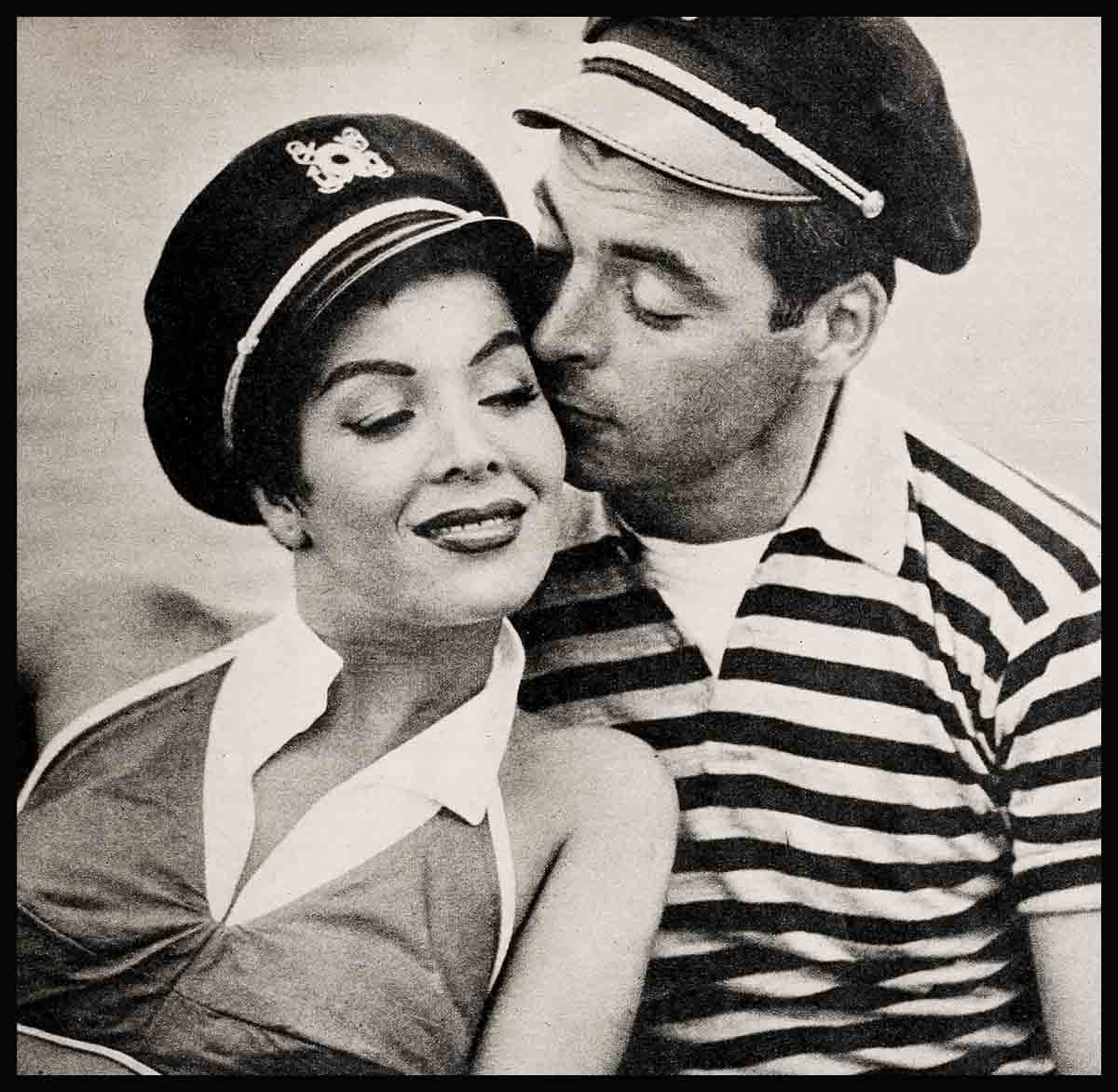
Design For Loving—Rory Calhoun & Lita Baron
There is a small, round table next to the bandstand at Hollywood’s famous Mocambo, across which many of the most headlined movie star romances have been born. Across which, too, sad endings have been written.
It was at this table that Rory Calhoun sat a little more than seven years ago, an obviously lonesome guy. Johnny, the red-jacketed, diminutive waiter knew it. So did the half dozen blondes, brunettes and red heads who had danced with Rory right here at Mocambo for the last three weeks. In the wise way of Hollywood glamour girls, they sensed that here was a man who was looking for something, and that they obviously, individually and collectively were not it.
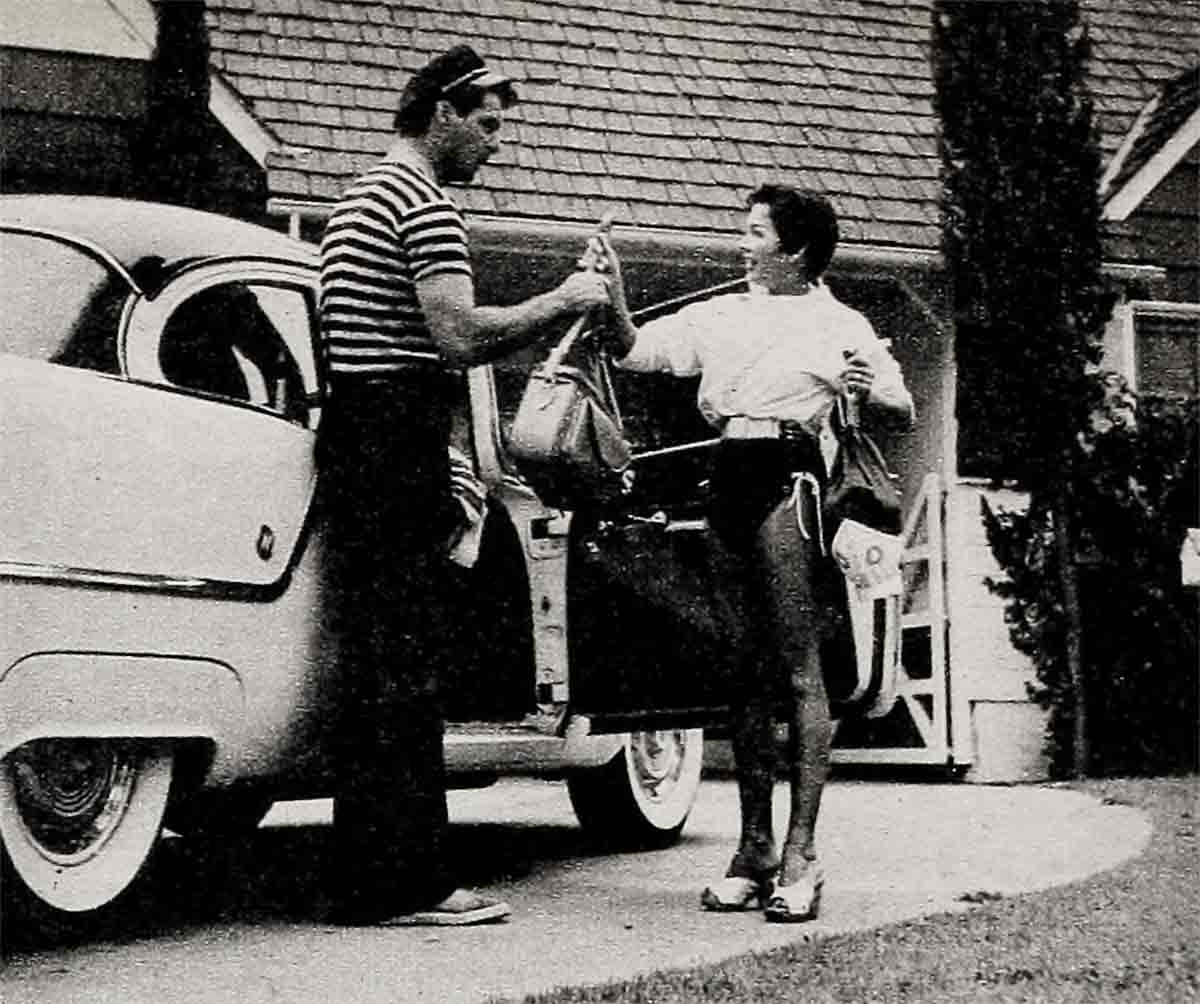
Rory was waiting for something, and not until the rhumba music stopped did the speculative people at nearby tables suspect why this most handsome of young stars, a bucket of champagne beside him, sat contemplating the two unfilled glasses at the table. As the band prepared to “take five” (five minutes off between numbers) the trivial mystery was solved. The actor stood up, barring the path of the tiny brunette singer just stepping down from the stand.
“Miss Baron—Lita—I’m Rory Calhoun.”
Lita Baron looked way up at Rory’s face, and remembers that she said,
“I know.”
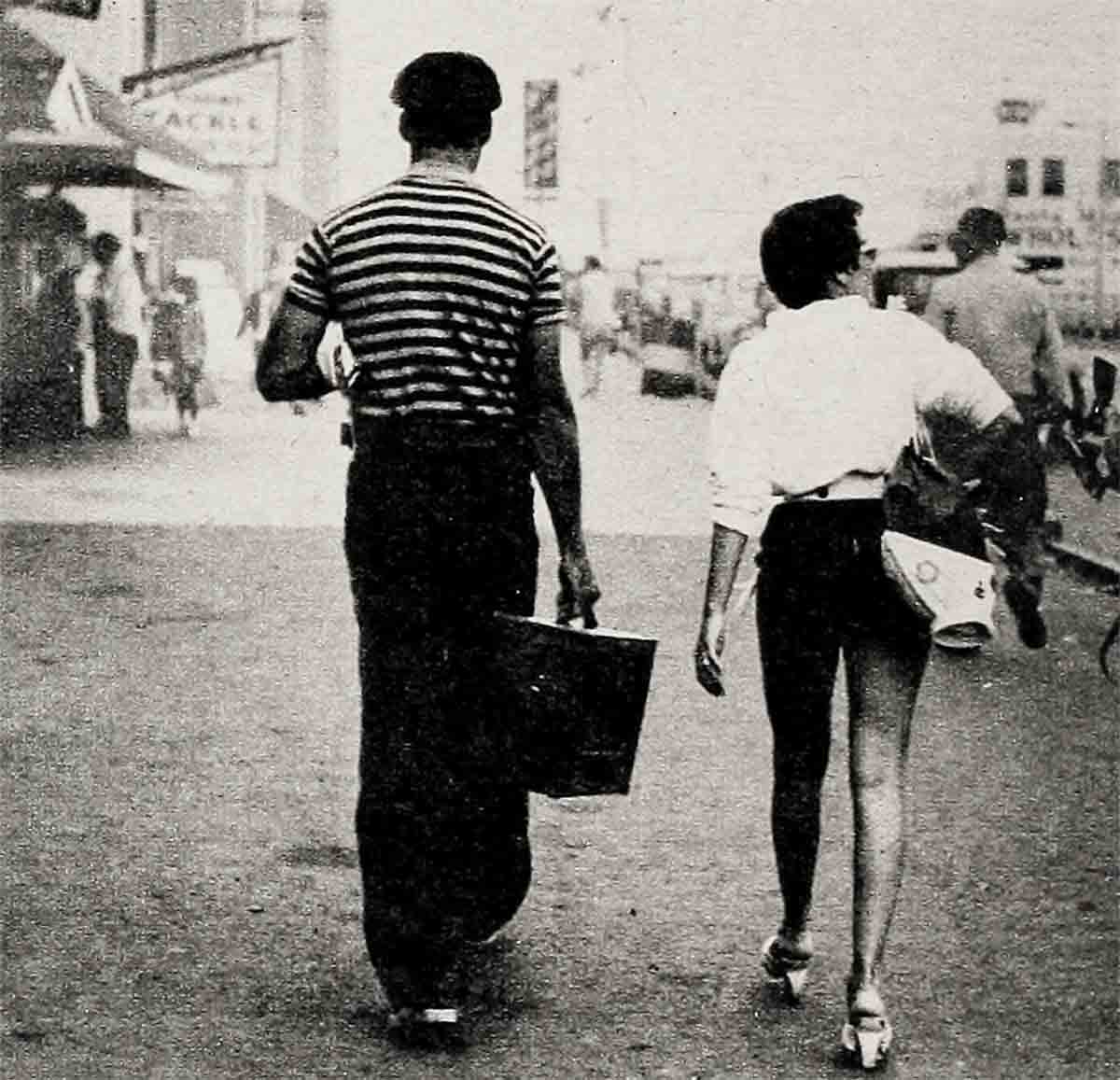
If her attitude at the time was a little on the cool side, she was to be forgiven, for as Xavier Cugat’s star vocalist, and during her career as Isabelita, a very young girl with her own South American rhumba band, she was familiar with the techniques of actors and playboys whose sudden interest passes in the night. “I appear to be deserted tonight,” Rory told her. “You won’t remember me, but the last time I saw you was in San José when a gang of us came down from a lumber camp to hear Cugat. I thought perhaps you’d join me for a drink during intermission.”
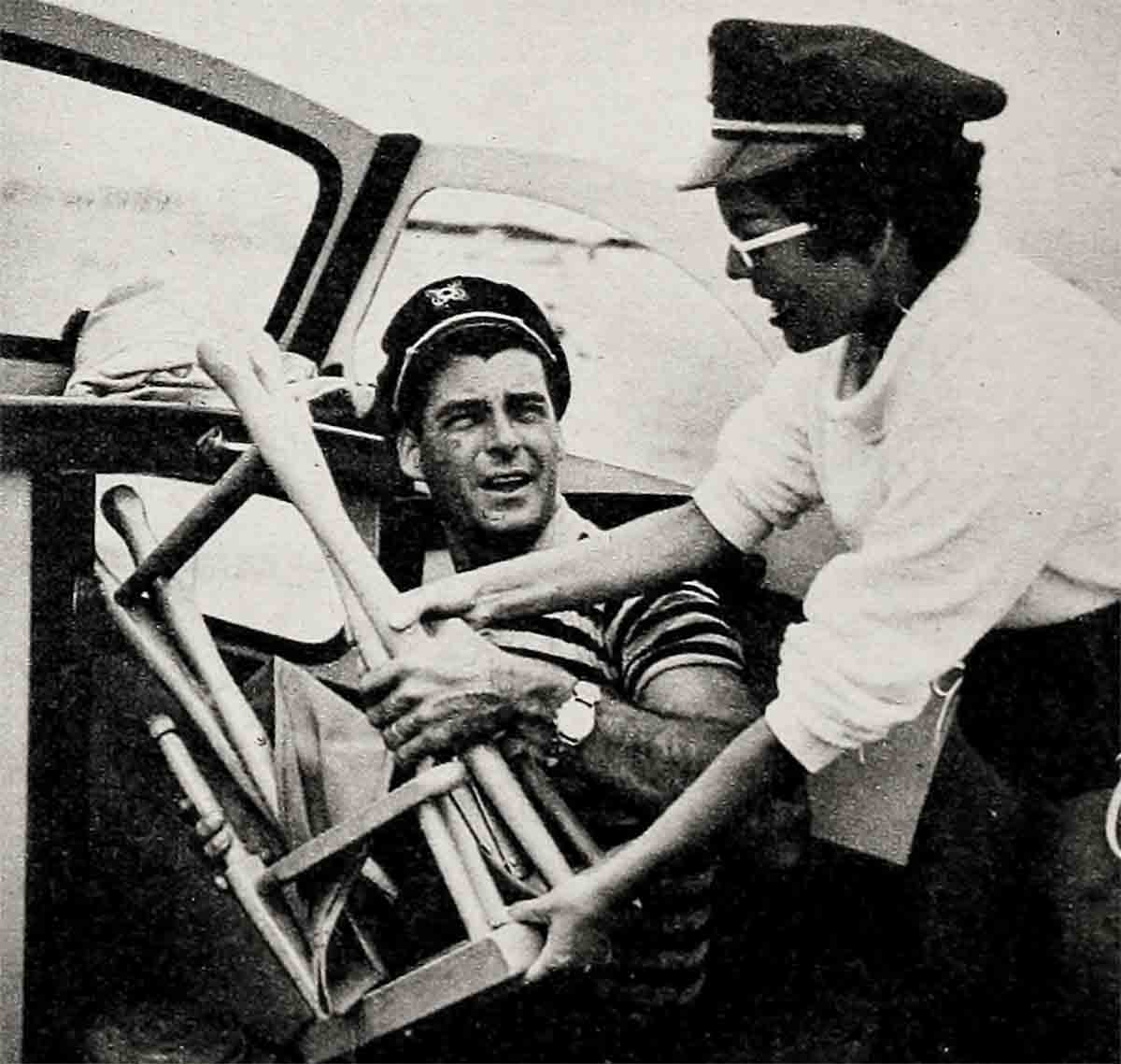
Lita explained with gentle finality that it was against the house rules to have a drink with a customer. Later as she rejoined the orchestra, she flashed Rory a smile, the same one she tossed at all Mocambo guests. But it gave him hope, so he stuck around, ignoring the cynical smiles of wolves at nearby tables who themselves had attempted and failed to win a date with this girl.
Later in the evening as another band replaced hers, Rory tried again, suggesting just one dance. He talked quietly and swiftly. She discovered they had friends in common. He was not on the prowl. He was a nice guy and so interesting that she wanted him to drive her home that night. She called her brother who customarily dropped by to help run the gauntlet of single male customers with late-hour ideas and explained that a friend was giving her a lift home.
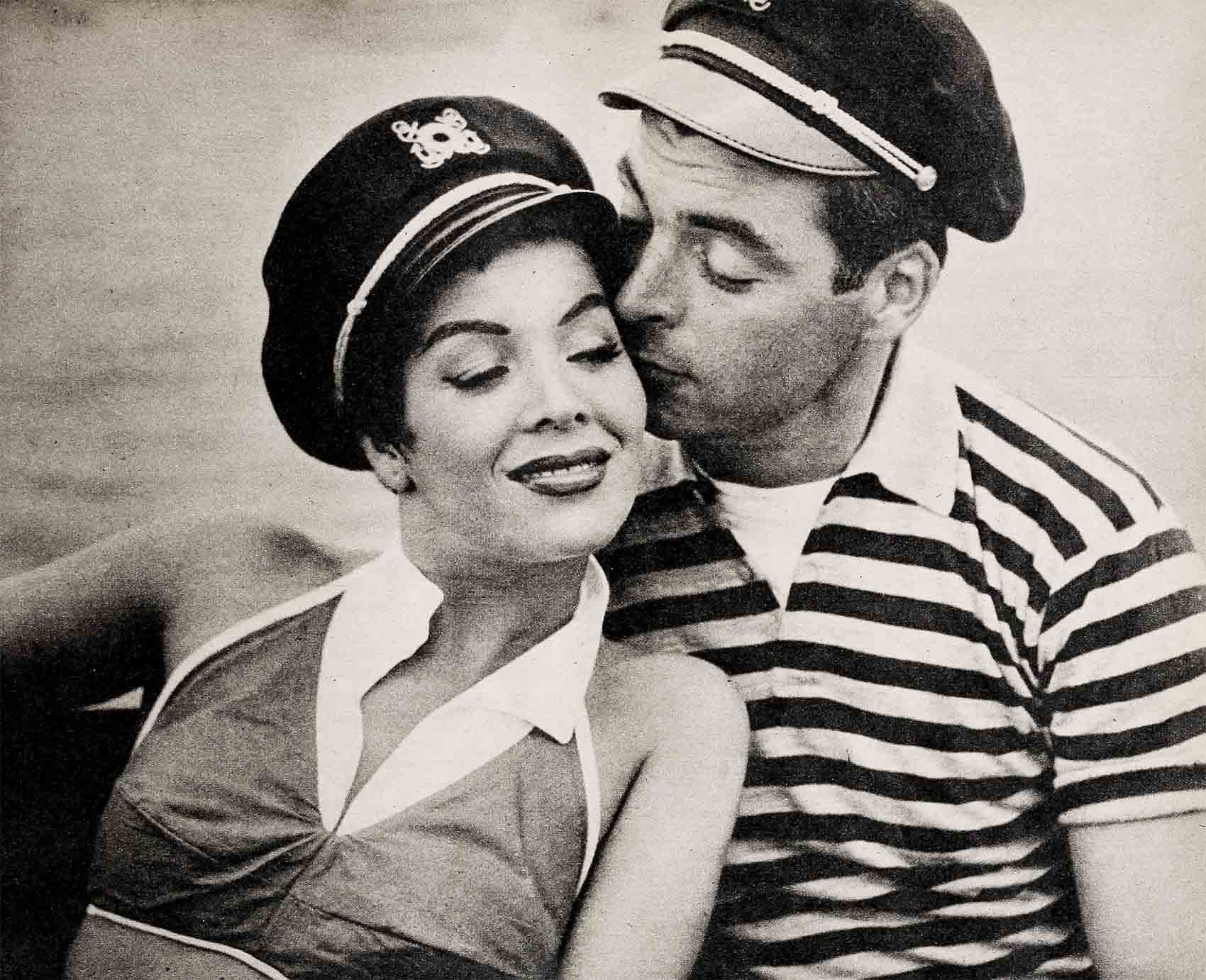
“That’s the longest ride home I ever had,” Lita remembers as she considers the early days of her romance with Rory. “We had a cup of coffee at one drive-in. A hamburger at another and a piece of pie at a third. At four A.M. he pulled us up in front of my house in his little Studebaker roadster. The lights were all on, and my mother and dad and brother confessed that they were about to send out an alarm.
“Poor Rory. They invited him in for a cup of coffee. A half hour later, he confessed behind a smothered yawn that he had to catch a six A.M. plane for a picture location in San Francisco. I told him he’d get no sympathy from me. Keeping us up all night just so he could kill time before a trip was a mean trick. After he’d gone, I frankly doubted that I’d ever hear from him again.”
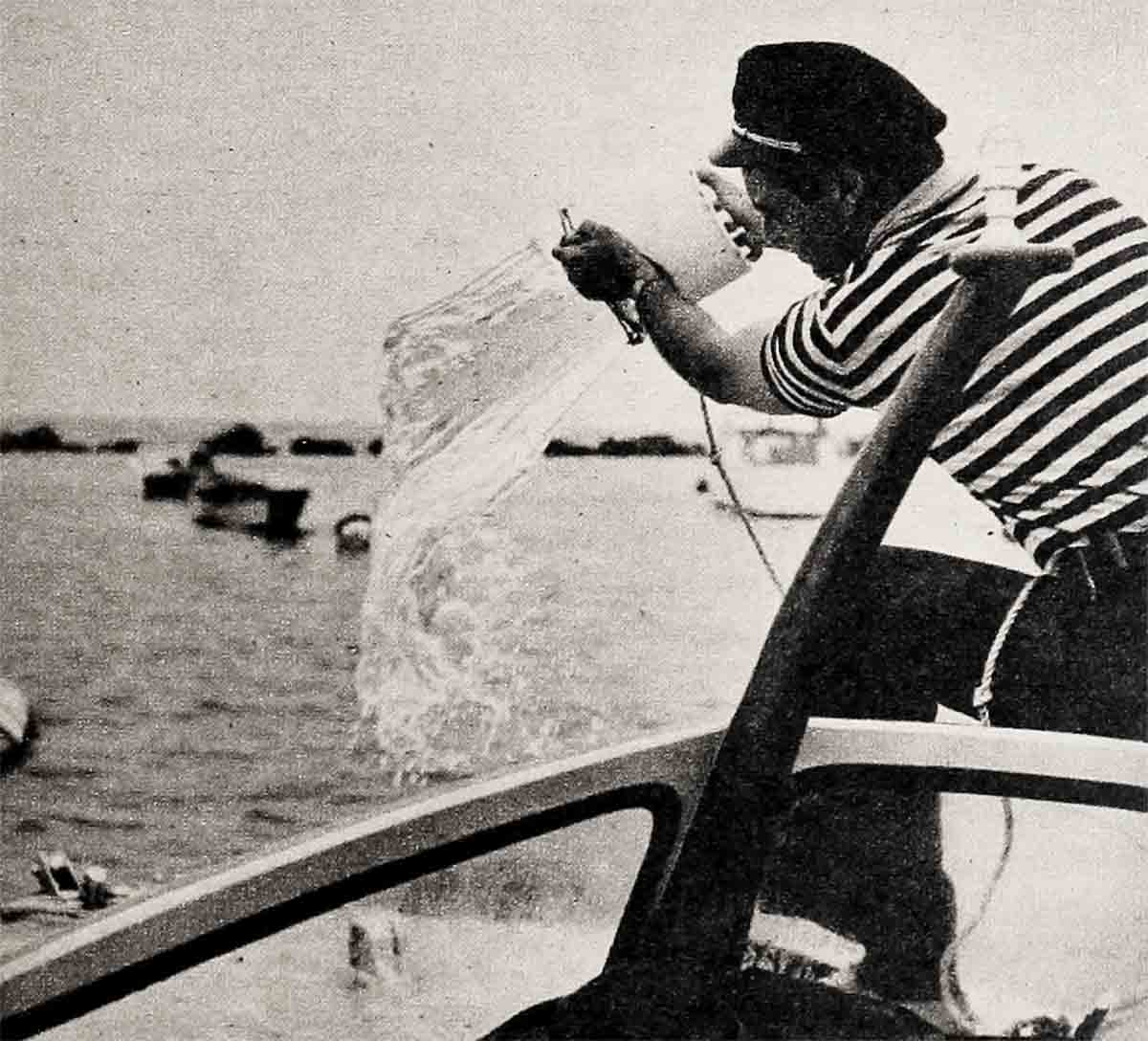
Lita didn’t know her-man very well then. She didn’t know that, unlike many another Hollywood actor, being a motion picture star was not the most important thing in Rory Calhoun’s life, nor would it ever be. Friends told her on casual inquiry that the way they heard it, Rory didn’t have much chance to be a great big star. For one thing, he wasn’t prepared for such a career. He was just a great big handsome lumberman from Vera Cruz who came to Los Angeles to visit his grandma by whom he’d been brought up. And it just happened that while he was out horseback riding Alan Ladd spotted him and with Sue’s help managed to get him a job acting in The Red House. He had worked around here and there, had a stock contract at Selznick studios, but every time a big part came up the big boss hired a big star instead.
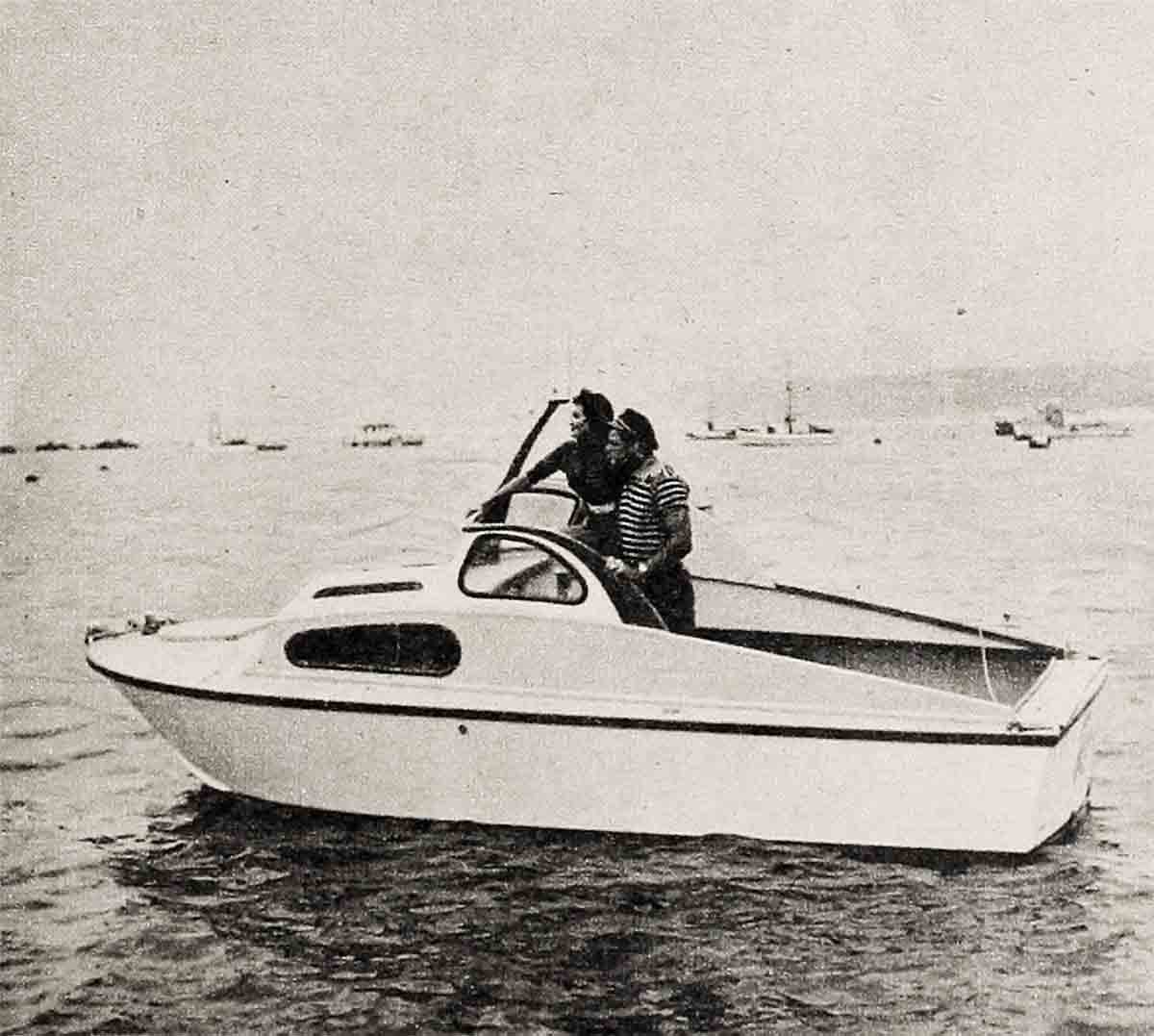
A lot has happened since that time, but before going into that, let’s go to something that happened on location for Universal-International’s picture, The Looters, a few weeks back. Rory had taken Lita to Colorado Springs for the location. Lita, not being what Hollywood knows as a persistent “location wife,” was staying in a hotel in town. The phone rang.
‘Rory is sending a car for you,” a voice said. “He wants you up here right away.”
“Oh no,” Lita replied. “Tell him I’m doing all right. Not a bit lonesome.”
The voice persisted. “He won’t take no for an answer. Says it’s very important.”
Two hours later, full of anxiety, Lita arrived on the set, and as she walked past the cameras toward a huddle of cast and crew around a huge table the hills resounded with the singing of “Happy Anniversary.” Lita almost wept, and cameras recorded the event which she says is one of the nicest surprises she’s had in her life.
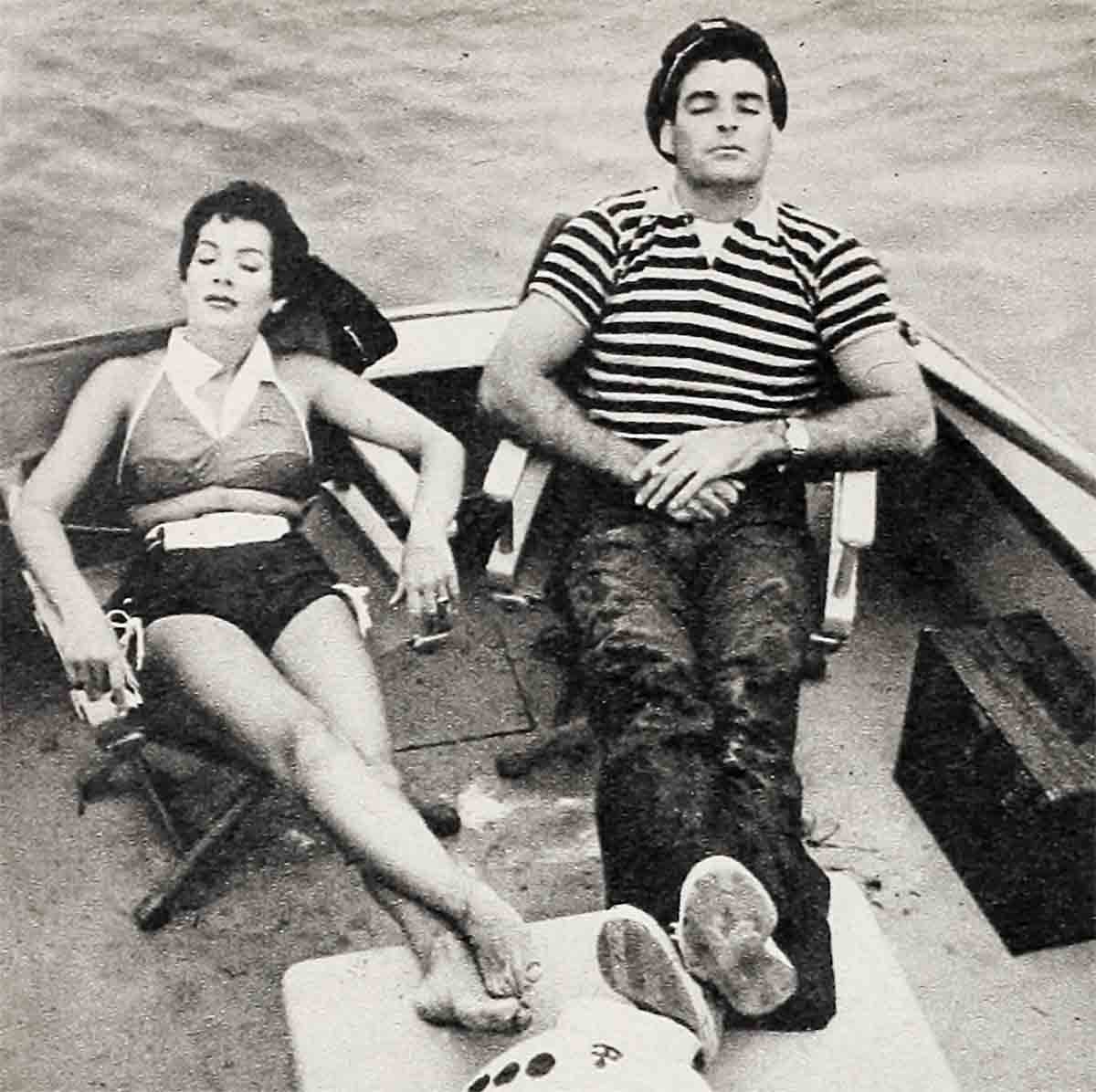
That night, as they sat around the campfire, everybody told anecdotes about his own courtship and marriage.
Finally it was up to Rory, who is far from the most talkative guy among actors. In fact, if it had not been that he was among close friends, and there happened to be a talkative one in the bunch, this story couldn’t have been told.
Seems that after Rory caught his six a.m. plane for San Francisco after that first all-night date with Lita, he was a “gone guy.” Every day he managed to get next to a phone and run up a whopping bill. Not long after his return, he built up their occasional dates into a steady thing, and on his birthday, August 8, again driving her home, he worked up the courage to say, “Let’s fall in love and get married.”
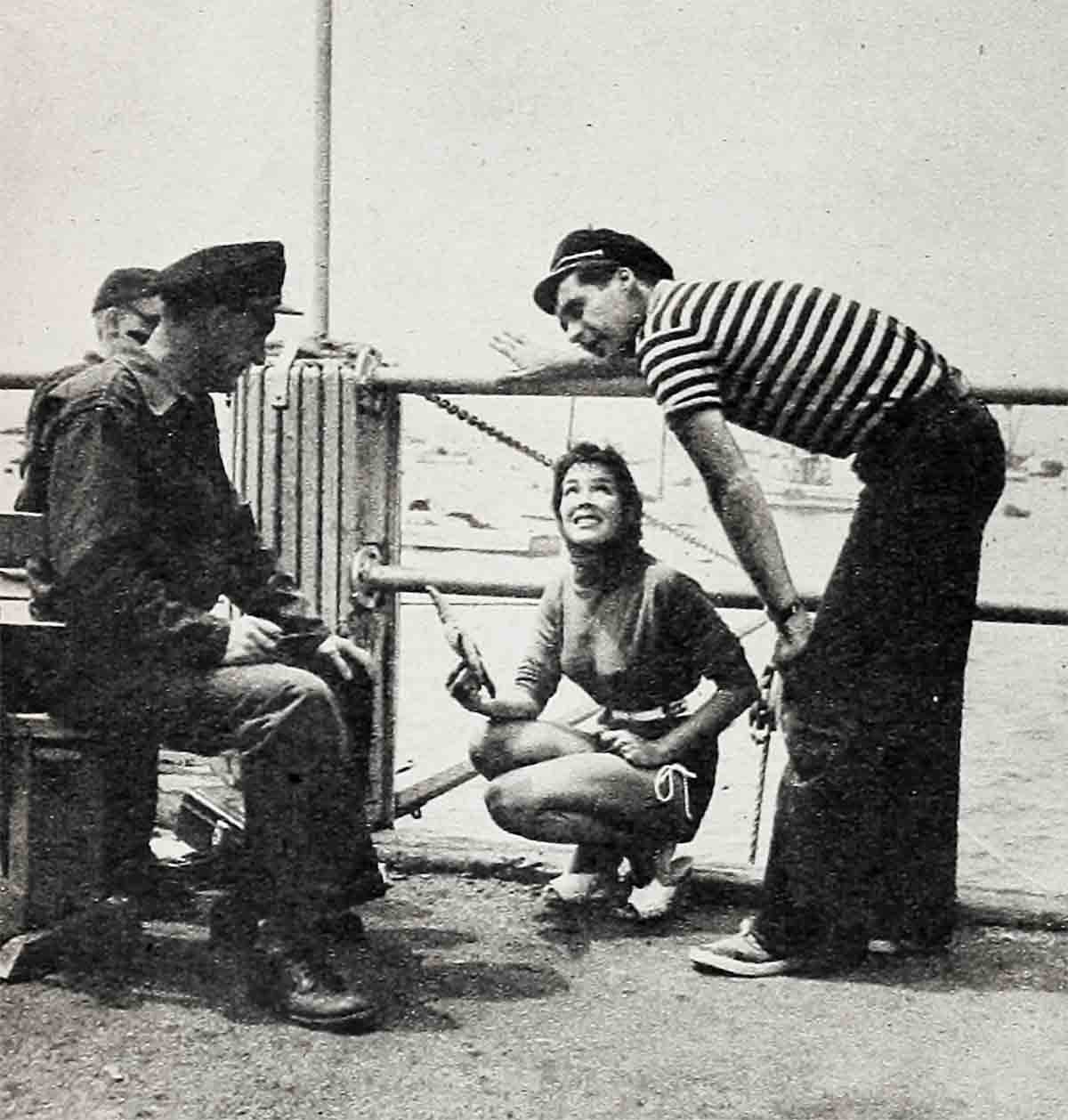
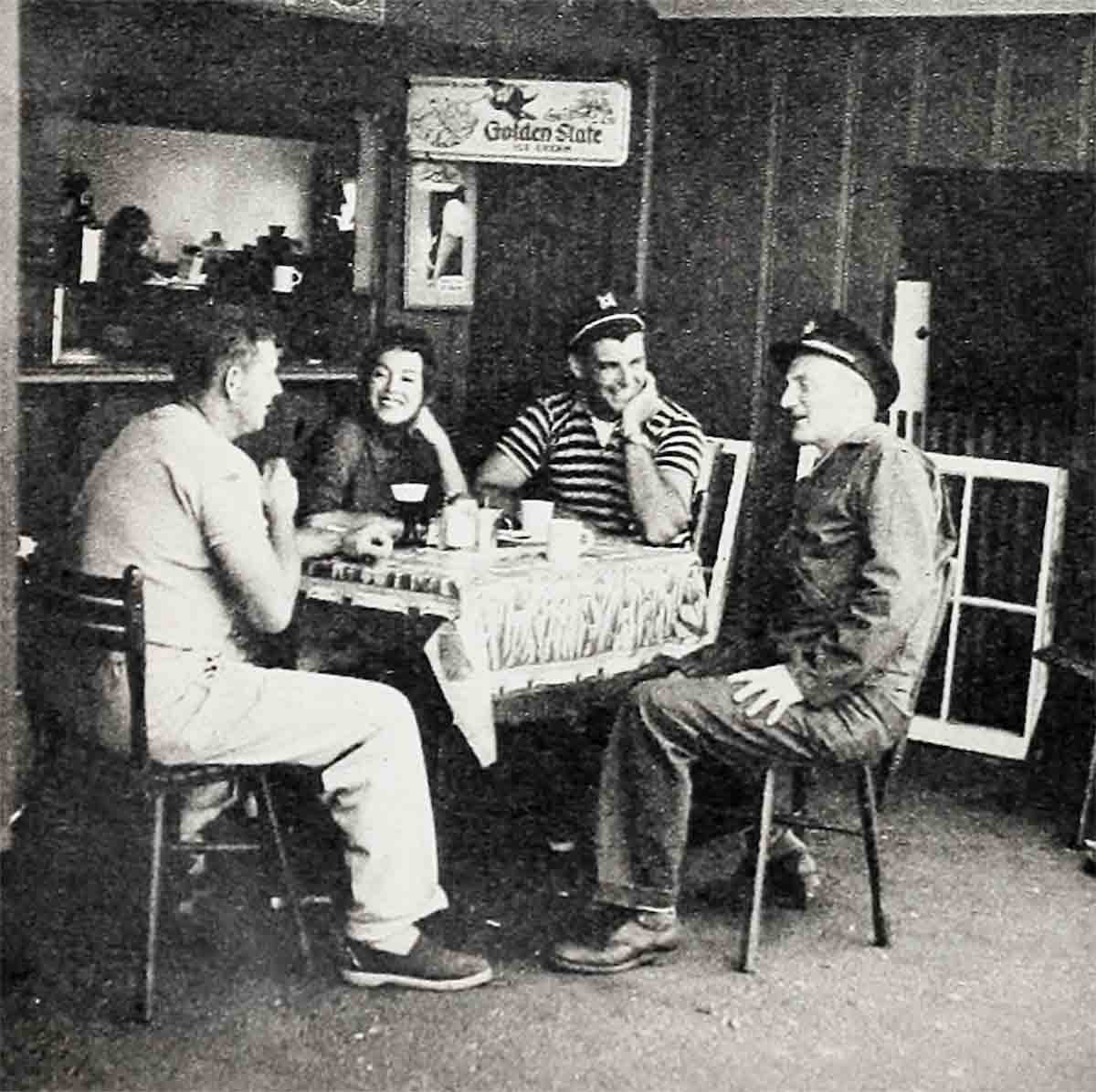
There may be other nightclub entertainers who, on receiving a proposal, have said, “You’ll have to ask my mother and father.” None are on record until now.
“Lita’s mom and dad had a restaurant and parking lot on Cherokee Street in Hollywood at the time,” Rory recalls. “I used to drop in there at odd hours, help park cars, work in the kitchen with Lita’s brother, Pete. So Lita and I drove down there, and while she went in to talk to her mother, I buttonholed her dad.
“ ‘Mr. Castro,’ I said, ‘do you want to go to a wedding next Sunday?’ He said sure, whose wedding? ‘Your daughter’s,’ I told him.
“ ‘My daughter’s? Lita’s? For golly’s sake, who would she be marrying?’
“ ‘Me,’ I told him.”
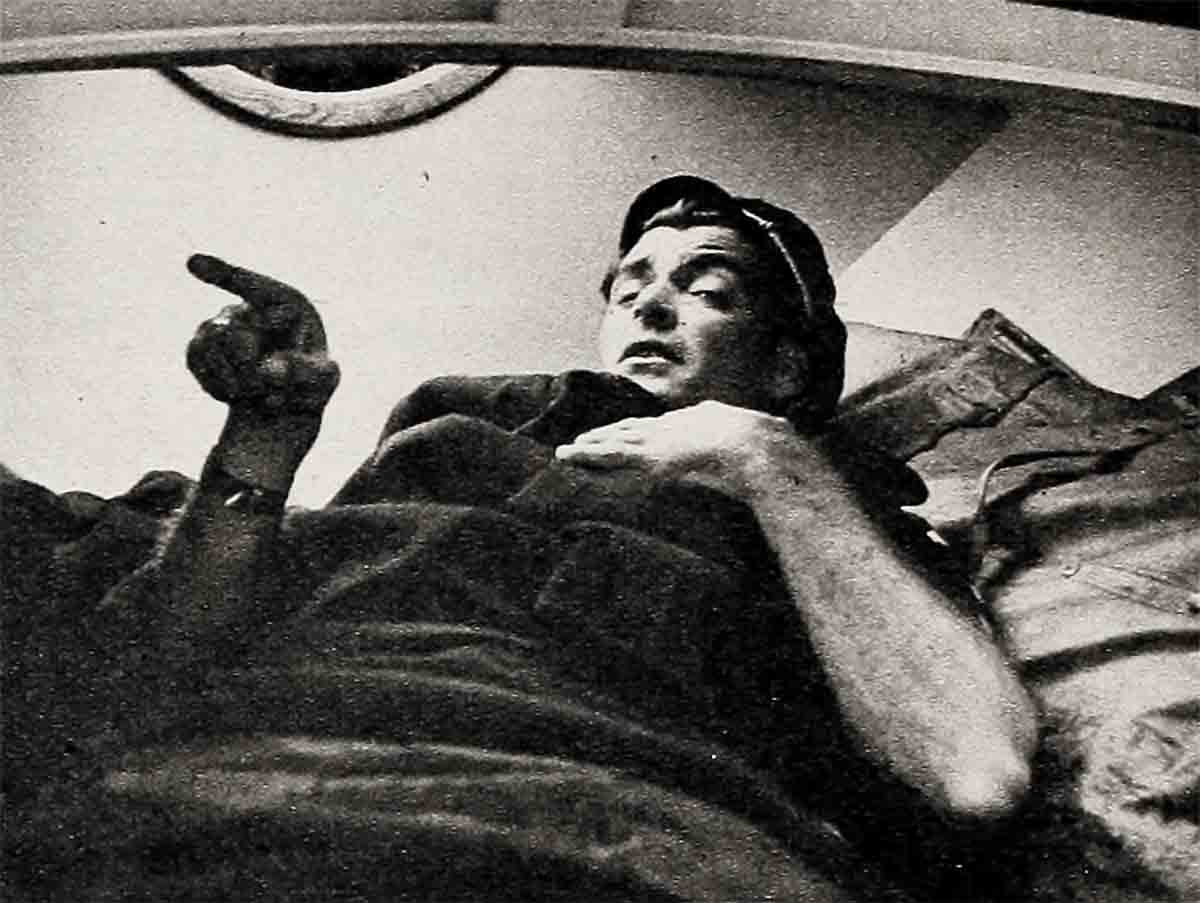
Neither Mr. nor Mrs. Castro could believe it. Mother Castro, once convinced, held out for a church wedding. They were fond of Rory, but both being Catholic, they wanted their daughter to be married in the family faith. The urgency of first love not to be denied, Lita and. Rory insisted that they were going to be married the following Sunday in Santa Barbara. The wedding took place on schedule in an Episcopal church with Rory’s mother and stepfather present, as well as all of Lita’s family.
Since then, this love that first blossomed in the dimly lit and improbable atmosphere of nightclub Mocambo has flourished beyond all the expectations of hardboiled columnists who first made note of it. Except for an occasional experimental jab aimed by some irresponsible reporter, there has been no sort of factual discord between Mr. and Mrs. Rory Calhoun.
A miracle? Not if you know Rory Calhoun. He doesn’t think like a movie star and he doesn’t behave like a movie star husband of the usual type. It isn’t necessary for him to prove his manhood by occasionally “straying off the reservation,” and coming home just short of the filing of divorce papers. For one thing, most male (and some female stars) sooner or later cease to think of other human beings as quite in the same class with themselves.
Rory Calhoun, on the other hand, is closer to “people” than he is to fellow stars. One of them asked him, “Don’t you get tired of all these interviews?”
“How can you ask that?” Calhoun responded, incredulously. “Look, friend, when I talk to a reporter, I’m talking to people. Sometimes in this business we may think that we’re mythical gods, but we are people. And when I am interviewed I’m not being a great, big, generous guy when I say that these are my people; at least those who have been kind enough to express an interest in me. Without them, I’d have been flat on my back long ago. Matter of fact, I was flat on my back and they saved me. Not just the “movie fans” that so many Hollywood characters express in terms of utter boredom. I mean the sensible men, women and kids who have written me wonderful, intelligent letters. As long as I can talk and as long as they care, what they want to know about me they can know.
“When I say the pleasure is all mine, I’m not being a politician. The pleasure is mine! Did you know that these people were rooting for me when all I was on the screen was a few chin whiskers and a middle background camera shot? The people who pay for tickets at the box office are the star-makers, star-shakers and star-breakers, and I’m not apple-polishing when I say so. I hope that my life is going to be such that they’ll always keep that personal interest.”
About that life, on a couple of occasions Rory was so discouraged that he nearly chucked his screen career for the outdoor life which he knew would support him. But his “people” always showed such strong interest that the gradual contract manipulations no one quite understands finally led him from studios where he was little or seldom used to his present seven-year contract with Universal-International. The pictures may not always delight the critics, but they pay off. Dawn at Socorro and Four Guns To The Border are two.
In the intervening years, Rory and Lita have had their good times and bad, but they’ve never done any public moaning. Two years ago, they finally managed to buy the home they wanted, a solid ranch style house in Beverly Hills, with a swimming pool and plenty of room for Rory’s boat, which he built almost entirely himself, an archery set, and other sports equipment. Hardly had they moved into it when tragedy struck. Lita lost an expected child. She had been in a dancing picture and hadn’t known about the expected event until she had overtaxed herself. Philosophically, they agree that they will be blessed again.
This year, too, Rory’s beloved Grandma Mickey, whom he was visiting when he was first discovered, died while he was far away on a location he couldn’t leave.
On the brighter side, Rory’s ranch investments are finally turning out to be more assets than liabilities. Oddly enough, Lita’s parents left Spain because they didn’t like the country. Peter Castro didn’t care for ranches and Mom always was “tooken” with a severe sunburn when she stayed out in the sun for a half hour. They were desolate when the freeway construction ploughed under their nice home in Hollywood, but along about that time Rory’s grandpa passed away, forgetting to leave a will. Rory helped them bid in his home and ranch near Ojai, not far from Rory’s own place. It’s not far from the Ojai Inn and it’s across the street from a fabulous home Loretta Young is building.
This is why, on week-ends, you can seldom find the young Calhouns at home. If they’re not winging their way toward Boulder Dam with Rory’s boat on a trailer, they’re visiting Mom and Dad. Lita confesses that at first she too, didn’t like the country too much, and water made her sick.
“I got used to it, though,” she says now, “and if you want to know the one big secret of the happiness Rory and I are having together, it’s in leading our outdoor life together. We just don’t come home, sit, and after dinner rush out to parties. Our favorite spot is Calhoun Cove. It’s on the Colorado River and we like to go up there with some friend like Guy Madison, camp out with sleeping bags, stay out fishing all day, then come back and settle down to planked fish and tossed salad before a huge campfire.
“There’s something else that’s important, if any young people happen to be listening. A good marriage doesn’t have to be confining. For instance Rory doesn’t mind at all if I work now and then. Last winter I took a job at the St. Regis Hotel, dancing and singing with Billy Daniel. Rory was busy and away on a picture location. But we weren’t separated more than three weeks. We’ve both seen people in show business rush off to Europe without each other. Human beings have a way of developing new interests when they are apart too long. When they get back together they don’t have a genuine interest in their mutual problems. I guess the best formula for a sound marriage is a combination of “don’t hedge me in, but for Pete’s sake, don’t stay away too long.”
Rory Calhoun seconds that, and adds: “It’s nice if a fellow’s wife can be handy with a rifle or a six-shooter when a man’s away. I just got back from bow and arrow hunting with Howard Hill to find that Lita had filed a report with the Beverly Hills police on a prowler. Seems that in the middle of the night she heard a noise below our second floor bedroom window. She listened for a few seconds to make sure it wasn’t a dog or a cat, then she sneaked into my den and grabbed a hunting rifle. It may have been silly for her to turn on the light, but the police say that the sight of her standing there aiming that artillery scared the daylights out of the prowler. He fell right through an awning and its a cinch he won’t be around Beverly Hills again for a long time. If an efficient police force isn’t bad enough, no sensible second-story man wants to face a wild-eyed little gal on the trigger end of a 30-30!”
THE END
—BY NATE EDWARDS
It is a quote. MODERN SCREEN MAGAZINE JANUARY 1955




